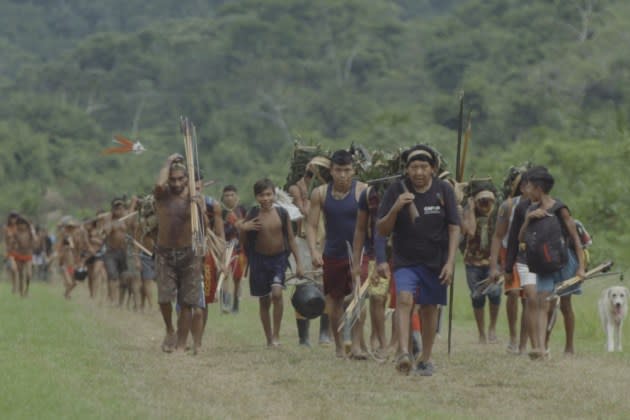‘The Falling Sky’ Review: The Yanomami People Deliver an Apocalyptic Warning in Scorching Resistance Doc

For about the first hour of their documentary “The Falling Sky,” Brazilian directors Eryk Rocha and Gabriela Carneiro da Cunha introduce us to the traditions and ongoing plight of the Yanomami Indigenous people — namely, fending off invaders — without making their presence known. There are no title cards stating where we are and why, and the only voiceover we hear comes directly from the Yanomami, most often Davi Kopenawa, their current leader and co-author of a 2010 book bearing the same title as the film.
But then, following a hypnotic ritual under the night’s sky, Justino Yanomami, an elderly Yanomami, retells the tragedy of his first encounter with white missionaries and the violence and disease they spread in their Amazonian land. With his face illuminated by a raging fire, an emotional Justino looks directly into the lens, directly at the filmmakers and at us, and asks, “Are you really going to be our allies?” recognizing that the intentions of the non-Indigenous faces behind the camera may not be different from those who have destroyed the forest and poisoned their water with their greed-driven activities. And in that same string of thoughts, he painfully verbalizes his conflicted feelings about letting himself be filmed by white outsiders when his people have endured so much suffering at the hands of neocolonial practices.
More from Variety
From that moment on, any semblance that this could be a typical piece of ethnographic cinema dissipates. Instead, Rocha and Carneiro da Cunha’s entrancing must-see pronouncement of a film serves as a portal for the Yanomami to communicate with the “merchandise people,” as they describe all of us existing in a capitalist system that disregards nature for financial gain. Up until the early 1970s, the Yanomami had existed in relative isolation. But during Brazil’s military dictatorship, a highway was built through their territory, not only ravaging the environment, but opening them to the dangers of those eager to profit from natural resources who brought pollution, violence and diseases. Since then, they’ve lived in a constant state of anxiety.
The long takes throughout demand that we experience the world at the Yanomamis’ pace, even if it’s only for a brief time. “The Falling Sky” opens with a still frame that observes a contingent of Yanomami, led by Kopenawa, for several uninterrupted minutes as they slowly get closer to the camera and a cacophony of sounds they are collectively creating flood our ears. Their chants blend almost indistinguishably with the sounds of the living creatures around them, which is testament to how in sync with the natural world they are. Central to Rocha and Carneiro da Cunha’s engagement with the Yanomami is the “reahu” ritual, one of the most significant occasions in their cosmology when, by sniffing the hallucinogenic substance known as “yakoana,” they connect with the “xapiri” spirits in the realm of dreams.
In their immersive account of both the Yanomamis’ everyday social affairs and sacred ceremonies, the directors convey their hosts’ distinctly patient relationship to time: the crows moving across the sky or their walks in groups. They don’t see themselves as existing in a short-lived present, but as part of a longstanding lineage with a strong purpose in harmony with the Earth, one that emerged before more recent — and rigid — concepts of civilization. Rocha and cameraman Bernard Machado manifest these notions in their unhurried and otherworldly visual dynamic, which admittedly may require some adjusting for those unaccustomed to slow-moving cinema. Each frame carries both a dignified divinity and strong sense of urgency.
Based on their own accounts, the Yanomami population has been decimated by the toxic waste from mining activities and viruses like malaria that penetrate their once untainted domain. Over a radio — one of the few pieces of modern technology they have embraced for their safety — a Yanomami woman in a neighboring community expresses fear that when the miners reach their area to extract gold, they might rape the girls and kill their children. Hearing her concern, it’s impossible not to feel like we have traveled back in time hundreds of years to when Europeans first arrived on the continent. Those historical patterns of despicable colonial violence against Indigenous populations endure in the 21st century.
Near the end, over a black screen, Kopenawa delivers an apocalyptic warning to any white person watching, specifically those from countries with a history of colonization. And in the fury of his words, there’s also a promise of vengeance. “Money is the only thing you whites really cry over,” he says in a speech explaining that when the last shaman dies, there will be no more time for atonement and nature will claim its revenge. No longer will the “xapiri” spirits hold up the sky and disaster will reign. One of the most necessary and scorching pieces of nonfiction storytelling in recent memory, “The Falling Sky” offers no comfort and points fingers with a ferocious righteousness as we stare into the abyss of the inescapable environmental catastrophe so-called “developed nations” have wrought.
Best of Variety
Sign up for Variety’s Newsletter. For the latest news, follow us on Facebook, Twitter, and Instagram.

 Yahoo News
Yahoo News 